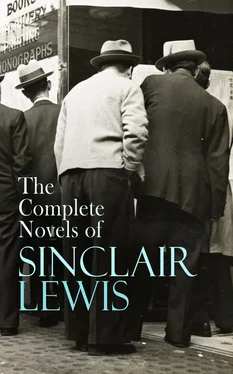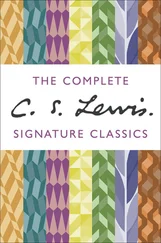“And they're right! They ought to run him out of town! Why, he preaches — if you can call it preaching — in a theater, in the House of Satan! You don't know what it is to find God, to find peace, to behold the snares that the devil spreads out for our feet. Oh, I'm so glad to see the mysterious purposes of God in having Paul harm me and stop my wickedness — and Paul's getting his, good and plenty, for the cruel things he did to me, and I hope he DIES in prison!”
Babbitt was up, hat in hand, growling, “Well, if that's what you call being at peace, for heaven's sake just warn me before you go to war, will you?”
III
Vast is the power of cities to reclaim the wanderer. More than mountains or the shore-devouring sea, a city retains its character, imperturbable, cynical, holding behind apparent changes its essential purpose. Though Babbitt had deserted his family and dwelt with Joe Paradise in the wilderness, though he had become a liberal, though he had been quite sure, on the night before he reached Zenith, that neither he nor the city would be the same again, ten days after his return he could not believe that he had ever been away. Nor was it at all evident to his acquaintances that there was a new George F. Babbitt, save that he was more irritable under the incessant chaffing at the Athletic Club, and once, when Vergil Gunch observed that Seneca Doane ought to be hanged, Babbitt snorted, “Oh, rats, he's not so bad.”
At home he grunted “Eh?” across the newspaper to his commentatory wife, and was delighted by Tinka's new red tam o'shanter, and announced, “No class to that corrugated iron garage. Have to build me a nice frame one.”
Verona and Kenneth Escott appeared really to be engaged. In his newspaper Escott had conducted a pure-food crusade against commission-houses. As a result he had been given an excellent job in a commission-house, and he was making a salary on which he could marry, and denouncing irresponsible reporters who wrote stories criticizing commission-houses without knowing what they were talking about.
This September Ted had entered the State University as a freshman in the College of Arts and Sciences. The university was at Mohalis only fifteen miles from Zenith, and Ted often came down for the week-end. Babbitt was worried. Ted was “going in for” everything but books. He had tried to “make” the football team as a light half-back, he was looking forward to the basket-ball season, he was on the committee for the Freshman Hop, and (as a Zenithite, an aristocrat among the yokels) he was being “rushed” by two fraternities. But of his studies Babbitt could learn nothing save a mumbled, “Oh, gosh, these old stiffs of teachers just give you a lot of junk about literature and economics.”
One week-end Ted proposed, “Say, Dad, why can't I transfer over from the College to the School of Engineering and take mechanical engineering? You always holler that I never study, but honest, I would study there.”
“No, the Engineering School hasn't got the standing the College has,” fretted Babbitt.
“I'd like to know how it hasn't! The Engineers can play on any of the teams!”
There was much explanation of the “dollars-and-cents value of being known as a college man when you go into the law,” and a truly oratorical account of the lawyer's life. Before he was through with it, Babbitt had Ted a United States Senator.
Among the great lawyers whom he mentioned was Seneca Doane.
“But, gee whiz,” Ted marveled, “I thought you always said this Doane was a reg'lar nut!”
“That's no way to speak of a great man! Doane's always been a good friend of mine — fact I helped him in college — I started him out and you might say inspired him. Just because he's sympathetic with the aims of Labor, a lot of chumps that lack liberality and broad-mindedness think he's a crank, but let me tell you there's mighty few of 'em that rake in the fees he does, and he's a friend of some of the strongest; most conservative men in the world — like Lord Wycombe, this, uh, this big English nobleman that's so well known. And you now, which would you rather do: be in with a lot of greasy mechanics and laboring-men, or chum up to a real fellow like Lord Wycombe, and get invited to his house for parties?”
“Well — gosh,” sighed Ted.
The next week-end he came in joyously with, “Say, Dad, why couldn't I take mining engineering instead of the academic course? You talk about standing — maybe there isn't much in mechanical engineering, but the Miners, gee, they got seven out of eleven in the new elections to Nu Tau Tau!”
Table of Contents
I
The strike which turned Zenith into two belligerent camps; white and red, began late in September with a walk-out of telephone girls and linemen, in protest against a reduction of wages. The newly formed union of dairy-products workers went out, partly in sympathy and partly in demand for a forty-four hour week. They were followed by the truck-drivers' union. Industry was tied up, and the whole city was nervous with talk of a trolley strike, a printers' strike, a general strike. Furious citizens, trying to get telephone calls through strike-breaking girls, danced helplessly. Every truck that made its way from the factories to the freight-stations was guarded by a policeman, trying to look stoical beside the scab driver. A line of fifty trucks from the Zenith Steel and Machinery Company was attacked by strikers-rushing out from the sidewalk, pulling drivers from the seats, smashing carburetors and commutators, while telephone girls cheered from the walk, and small boys heaved bricks.
The National Guard was ordered out. Colonel Nixon, who in private life was Mr. Caleb Nixon, secretary of the Pullmore Tractor Company, put on a long khaki coat and stalked through crowds, a .44 automatic in hand. Even Babbitt's friend, Clarence Drum the shoe merchant — a round and merry man who told stories at the Athletic Club, and who strangely resembled a Victorian pug-dog — was to be seen as a waddling but ferocious captain, with his belt tight about his comfortable little belly, and his round little mouth petulant as he piped to chattering groups on corners. “Move on there now! I can't have any of this loitering!”
Every newspaper in the city, save one, was against the strikers. When mobs raided the news-stands, at each was stationed a militiaman, a young, embarrassed citizen-soldier with eye-glasses, bookkeeper or grocery-clerk in private life, trying to look dangerous while small boys yelped, “Get onto de tin soldier!” and striking truck-drivers inquired tenderly, “Say, Joe, when I was fighting in France, was you in camp in the States or was you doing Swede exercises in the Y. M. C. A.? Be careful of that bayonet, now, or you'll cut yourself!”
There was no one in Zenith who talked of anything but the strike, and no one who did not take sides. You were either a courageous friend of Labor, or you were a fearless supporter of the Rights of Property; and in either case you were belligerent, and ready to disown any friend who did not hate the enemy.
A condensed-milk plant was set afire — each side charged it to the other — and the city was hysterical.
And Babbitt chose this time to be publicly liberal.
He belonged to the sound, sane, right-thinking wing, and at first he agreed that the Crooked Agitators ought to be shot. He was sorry when his friend, Seneca Doane, defended arrested strikers, and he thought of going to Doane and explaining about these agitators, but when he read a broadside alleging that even on their former wages the telephone girls had been hungry, he was troubled. “All lies and fake figures,” he said, but in a doubtful croak.
For the Sunday after, the Chatham Road Presbyterian Church announced a sermon by Dr. John Jennison Drew on “How the Saviour Would End Strikes.” Babbitt had been negligent about church-going lately, but he went to the service, hopeful that Dr. Drew really did have the information as to what the divine powers thought about strikes. Beside Babbitt in the large, curving, glossy, velvet-upholstered pew was Chum Frink.
Читать дальше












